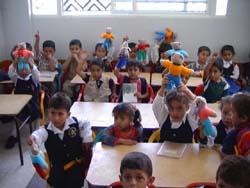16 December 2007
Dr Sarraj reports to Israeli 'Peace' Groups
Gush Shalomhttp://zope.gush-shalom.org/home/en/events/1197474415
A shocking first-hand report about living conditions in the Gaza Strip was delivered Thursday (Dec. 13, 2007) to a group of Israeli peace activists. They met in the Gush Shalom office in Tel-Aviv to listen to the testimony of Dr. Eyad Sarraj, one of the few people who still succeed in getting out of the `largest prison on earth`.
Dr. Sarraj, well-known psychiatrist and human rights activist, lives in the Strip. He has come to Tel-Aviv to discuss with Israeli peace activists protest and people-to-people actions. This is what he reported:
Local water is undrinkable. Israel does not let in bottled water. Nor does Israel allow the importation of water pumps. The price of water filters has gone up from 150 NIS to 1000 NIS, there are no spare parts at all for filters. Only the well-to-do can still afford them. However, chlorine is let in.
Israel prevents all imports into the strip, except a small list of about a dozen basic products. Before, 900 trucks were employed daily for the imports and exports of the Gaza Strip, now these are reduced to 15. For example, no soap is allowed in.
There is no cement. When there is a hole in the ceiling, it cannot be repaired. It is impossible to go on building the children`s hospital which has been begun. A medical instrument that goes out of order cannot be repaired, for lack of spare parts. For example: incubators for babies.
The severely sick cannot reach a hospital - neither in Israel, nor in Egypt or Jordan. The few permits issued are often delivered after a fatal delay. In many instances, patients are condemned to death.
Students cannot reach their universities abroad. Foreign citizens who happened to stay in Gaza cannot get out if they have a Palestinian ID. Palestinians who have contracts to work abroad are not allowed to leave. Some Palestinians were allowed to leave through Israel on the way to Egypt, but were not allowed in by the Egyptian authorities and returned to Gaza.
Practically all enterprises have been closed for lack of raw materials. Thus, the Coca Cola factory has closed down.
All prices in the Gaza strip have risen sky-high - fivefold and even tenfold. Life is now more expensive in Gaza than in Tel-Aviv.
How do people exist? Members of extended families help their members. Well-to-do people support their relatives. UNWRA brings in the most basic foodstuffs for the refugees.
Dr. Sarraj proposed to open immediately the border with Egypt, so that the inhabitants of the Gaza Strip could move freely through the Rafah border crossing, and import and exports their goods - as they did before 1967. He wants, of course, all the other crossings to be opened, too.
The Israeli peace camp is now the most important ally of the Palestinian people, he said, calling upon the peace forces to show their humane face to the Gaza population.
Following his report, the peace activists started to discuss practical ways to carry out joint actions with the people of Gaza. Several initiatives, which met with the approval of the guest, were debated. They were turned over to an action committee of the peace movements for urgent implementation.

